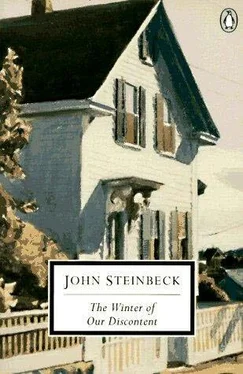John Steinbeck
The Winter of Our Discontent
To Beth, my sister, whose light burns clear
Readers seeking to identify the fictional people and places here described would do better to inspect their own communities and search their own hearts, for this book is about a large part of America today.
When the fair gold morning of April stirred Mary Hawley awake, she turned over to her husband and saw him, little fingers pulling a frog mouth at her.
“You’re silly,” she said. “Ethan, you’ve got your comical genius.”
“Oh say, Miss Mousie, will you marry me?”
“Did you wake up silly?”
“The year’s at the day. The day’s at the morn.”
“I guess you did. Do you remember it’s Good Friday?”
He said hollowly, “The dirty Romans are forming up for Calvary.”
“Don’t be sacrilegious. Will Marullo let you close the store at eleven?”
“Darling chicken-flower—Marullo is a Catholic and a wop. He probably won’t show up at all. I’ll close at noon till the execution’s over.”
“That’s Pilgrim talk. It’s not nice.”
“Nonsense, ladybug. That’s from my mother’s side. That’s pirate talk. It was an execution, you know.”
“They were not pirates. You said yourself, whalers, and you said they had letters of what-you-call-it from the Continental Congress.”
“The ships they fired on thought they were pirates. And those Roman G.I.’s thought it was an execution.”
“I’ve made you mad. I like you better silly.”
“I am silly. Everybody knows that.”
“You always mix me up. You’ve got every right to be proud—Pilgrim Fathers and whaling captains right in one family.”
“Have they?”
“What do you mean?”
“Would my great ancestors be proud to know they produced a goddam grocery clerk in a goddam wop store in a town they used to own?”
“You are not. You’re more like the manager, keep the books and bank the money and order the goods.”
“Sure. And I sweep out and carry garbage and kowtow to Marullo, and if I was a goddam cat, I’d be catching Marullo’s mice.”
She put her arms around him. “Let’s be silly,” she said. “Please don’t say swear words on Good Friday. I do love you.”
“Okay,” he said after a moment. “That’s what they all say. Don’t think that lets you lie jaybird naked with a married man.”
“I was going to tell you about the children.”
“They in jail?”
“Now you’re silly again. Maybe it’s better if they tell you.”
“Now why don’t you—”
“Margie Young-Hunt’s going to read me again today.”
“Like a book? Who’s Margie Young-Hunt, what is she, that all our swains—”
“You know if I was jealous—I mean they say when a man pretends he don’t notice a pretty girl—”
“Oh, that one. Girl? She’s had two husbands.”
“The second one died.”
“I want my breakfast. Do you believe that stuff?”
“Well Margie saw about Brother in the cards. Someone near and dear, she said.”
“Someone near and dear to me is going to get a kick in the pants if she doesn’t haul freight—”
“I’m going—eggs?”
“I guess so. Why do they call it Good Friday? What’s good about it?”
“Oh! You!” she said. “You always make jokes.”
The coffee was made and the eggs in a bowl with toast beside them when Ethan Allen Hawley slid into the dinette near the window.
“I feel good,” he said. “Why do they call it Good Friday?”
“Spring,” she said from the stove.
“Spring Friday?”
“Spring fever. Is that the children up?”
“Fat chance. Lazy little bastards. Let’s get ’em up and whip ’em.”
“You talk terrible when you’re silly. Will you come home twelve to three?”
“Nope.”
“Why not?”
“Women. Sneak ’em in. Maybe that Margie.”
“Now Ethan, don’t you talk like that. Margie’s a good friend. She’d give you the shirt off her back.”
“Yah? Where’d she get the shirt?”
“That’s Pilgrim talk again.”
“I bet you anything we’re related. She’s got pirate blood.”
“Oh! You’re just silly again. Here’s your list.” She tucked it in his breast pocket. “Seems like a lot. But it’s Easter weekend, don’t forget—and two dozen eggs, don’t forget. You’re going to be late.”
“I know. Might miss a two-bit sale for Marullo. Why two dozen?”
“For dyeing. Allen and Mary Ellen asked specially. You better go.”
“Okay, bugflower—but can’t I just go up and beat the hell out of Allen and Mary Ellen?”
“You spoil them rotten, Eth. You know you do.”
“Farewell, O ship of state,” he said, and slammed the screen door after him and went out into the green-gold morning.
He looked back at the fine old house, his father’s house and his great-grandfather’s, white-painted shiplap with a fanlight over the front door, and Adam decorations and a widow’s walk on the roof. It was deep-set in the greening garden among lilacs a hundred years old, thick as your waist, and swelling with buds. The elms of Elm Street joined their tops and yellowed out in new-coming leaf. The sun had just cleared the bank building and flashed on the silvery gas tower, starting the kelp and salt smell from the old harbor.
Only one person in early Elm Street, Mr. Baker’s red setter, the banker’s dog, Red Baker, who moved with slow dignity, pausing occasionally to sniff the passenger list on the elm trunks.
“Good morning, sir. My name is Ethan Allen Hawley. I’ve met you in pissing.”
Red Baker stopped and acknowledged the greeting, with a slow sway of his plumed tail.
Ethan said, “I was just looking at my house. They knew how to build in those days.”
Red cocked his head and reached with a hind foot to kick casually at his ribs.
“And why not? They had the money. Whale oil from the seven seas, and spermaceti. [1] spermaceti: Moby-Dick or The Whale (1851), by Herman Melville, was one of Steinbeck’s two favorite novels, according to Elaine Steinbeck; Don Quixote was the other. Spermaceti is mentioned in chapter 77, “The Great Heidelburgh Tun.”
Do you know what spermaceti is?”
Red gave a whining sigh.
“I see you don’t. A light, lovely rose-smelling oil from the head cavity of the sperm whale. Read Moby-Dick, dog. That’s my advice to you.”
The setter lifted his leg on the cast-iron hitching post at the gutter.
Turning to walk away, Ethan said over his shoulder, “And make a book report. You might teach my son. He can’t even spell spermaceti, or—or anything.”
Elm Street runs at an angle into High Street two blocks from the old Ethan Allen Hawley house. Halfway down the first block a delinquent gang of English sparrows were fighting on the new-coming lawn of the Elgar house, not playing but rolling and picking and eye-gouging with such ferocity and so noisily that they didn’t see Ethan approach. He stopped to watch the battle.
“Birds in their little nests agree,” he said. “So why can’t we? Now there’s a bunch of horse crap for you. You kids can’t get along even on a pretty morning. And you’re the bastards Saint Francis was nice to. Screw!” He ran at them, kicking, and the sparrows rose with a whispered roar of wings, complaining bitterly in door-squeak voices. “Let me tell you this,” Ethan said after them. “At noon the sun will darken and a blackness will fall on the earth and you will be afraid.” He came back to the sidewalk and proceeded on his way.
Читать дальше











